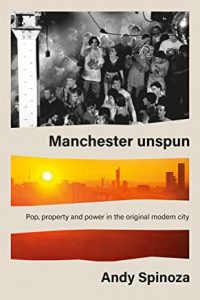Manchester Unspun: Pop, Property and Power in the Original Modern City by Andy Spinoza is a fascinating history of the extent to which my home city has changed since I left to go to university in 1978. It is a combination of personal memoir and political history, the latter seen through the lens of popular music – the famous Haçienda, Factory, Madchester phenomenon etc. The book describes the enormous changes in the built environment of the city centre, with property development a key vector of regeneration, led for much of the period covered by the due of Sir Howard Bernstein as chief executive and Sir Richard Leese as council leader. As it notes, this was often a controversial approach in its specifics, and for all the improvements in the centre remains contested.
The book was particularly interesting for me as I had a bit part in the first, George Osborne, devolution deal as the co-ordinator of the 2009 Manchester Independent Economic Review. Spinoza is dismissive of this effort but he seems to under-appreciate its role in getting the Treasury on board with the devolution journey. Anyway, I worked with the two Sirs and many others to put the MIER together, and I greatly admired them for their dogged and long-term determination to revive Manchester – a project 40 years in the making since the depths of deindustrialisation. The MIER in any case provided a baseline against which the city could judge its future progress. This hasn’t been overwhelming – as we noted in the follow up Prosperity Review in 2019/2020. Manchester still punches below its weight in terms of productivity, still has problems of housing and homelessness, still has great inequalities between and within its constituent authorities, still needs to improve its skill base, and so on.
Yet it has changed so much for the better since I left as all the mills were closing down but the rivers remained polluted and the buildings blackened. More than half the students graduating there now stay in the city region. Andy Burnham’s mayor-ship has helped create a stronger political identity. It continues to be a cultural dynamo (Mike Emmerich, a Manchester eminence grise, has written compellingly about the role of culture in cities). I really enjoyed reading Manchester Unspun for the history told through music – largely new to me. One for all Mancunians and all keen to see the UK’s cities other than London regain their mojo.

